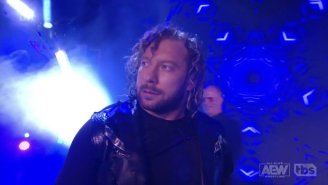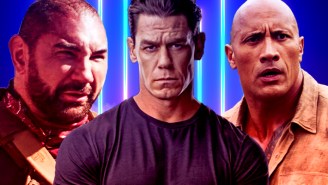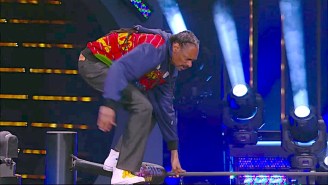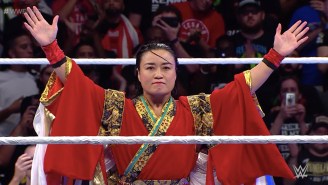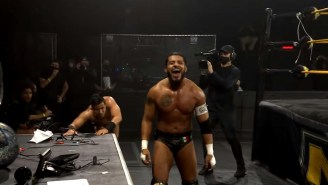Let’s do it: let’s talk about intergender wrestling. Matches between men and women are a topic often avoided among wrestling fans, because it can be so explosive. But it’s a part of wrestling that hasn’t gone away, and has even reached more prominence on shows like Lucha Underground.
It’s also a part of many independent promotions, of course. Current NXT up-and-comer Abbey Laith, for example, was the Grand Champion of Chikara, the top title of that male-dominated company. Ruby Riot also engaged many intergender matches there and at other companies. Frequent NXT guest and Mae Young Classic competitor Candice LeRae is famous for her intergender matches, at PWG and elsewhere.
And while many people have said that intergender wrestling will never return to WWE, they’ve now been proven wrong with an intergender match on Smackdown, between Becky Lynch and James Ellsworth. It wasn’t much of a match, but it did happen. So this seems like a good time to look back at intergender wrestling at WWE, as well as at the two companies that WWE absorbed earlier this century, WCW and ECW. Maybe by exploring the history, we can better understand why so many people think of intergender as such a bad, distasteful idea.
The earliest intergender match in WWE that I could find was between Luna Vachon and Matt Knowles, on a 1998 Raw. Goldust (Luna’s onscreen partner at the time) beat up Knowles before the match started, but Luna did get the pin. There had been earlier matches in WCW involving Jacquelyn and Madusa (more on them shortly), but the arrival of intergender wrestling to WWE wasn’t all that impressive. But things were about to ramp up in a big way.
It was in 1999 that intergender wrestling really blew up. The frequency of these matches increased in all three major companies at the time, until by the end of the year it was happening nearly every week. Part of the reason for the boom was the general atmosphere of the era. With three companies on national television, they were all getting whatever attention they could by pushing whatever envelopes they could find to push. The other factor was a trio of women, one at each company, who were seen as formidable enough to take on men, and who were comfortable doing so. I’m going to take a minute to focus on each of them.
Madusa
Madusa had her first televised intergender match all the way back in 1996 at WCW Uncensored, when she fought Colonel Robert Parker in a “Man vs. Woman Match.” She looked pretty strong in the bout, but he won by cheating, and the less that’s said about the storyline around it, the better. She fought a few other men in her years at WCW, but one feud stood out.
At Starrcade 1999, Madusa challenged Evan Karagias for the Cruiserweight Championship. The two had previously had a match on Nitro as part of a WCW Championship Tournament which led to a romance angle between them, but by Starrcade Karagias was involved with a Nitro Girl named Spice. During the Cruiserweight title match, Spice turned on Karagias, punching him in the balls to help Madusa win the title.
In what might be my favorite ending to a romance angle in wrestling history, the two women unite against the man they’d both been involved with, and Spice becomes Madusa’s valet. There’s also definitely some bisexual subtext in the way Spice looks at Madusa. It’s all very ‘90s.
But if the beginning of Madusa’s Cruiserweight Title run was kind of magical, its ending was just as cringe-worthy. She lost the belt to Oklahoma, a character created to be a parody of Jim Ross. He was a large man with no particular wrestling skills who wore a cowboy hat and hit people with bottles of barbecue sauce. (You have no idea how much I wish I was making this up.) He proclaimed that he was going to win the belt to prove that men were better than women, and thanks to heel shenanigans, win it he did.
Madusa, Spice, and Asya (a female bodybuilder WCW hired in a blatant attempt to have their own Chyna) beat him up after the match and poured his own barbecue sauce on him, but the belt was already lost. And even when he was forced to vacate for exceeding the weight limit, Madusa never got to wrestle for it again.
Jazz
Meanwhile in ECW, Jazz was a powerful female fighter in a world where that was hardly a thing. In a promotion with no real women’s division, she had little choice but to fight men. She had a lengthy feud with Simon Diamond, who had a “Simon says” gimmick and a generally low regard for women. She also had some matches with Jason, whose gimmick I found disappointing because he doesn’t even wear a hockey mask. Still, his match against Jazz at Heatwave 1999 is worth a look.
Honestly, I’m not claiming any deep knowledge of ECW, but I can tell you that Jazz was a total badass (and still is — I saw her at King of Trios 2016), and for all the sexism on display there, ECW usually treated her as the badass she was.
Jazz was brought into WWE after ECW folded, where she won the Women’s Championship twice. She also fought her fellow ECW alum Bubba Ray Dudley for the Hardcore Championship on Raw in 2002, but that was really just a ploy to help Stevie Richards win it. Jazz held the Women’s Championship at the time, so she didn’t really need another title anyway.
Chyna
And of course, through all of this, a mainstay of WWE was the Ninth Wonder of the World, the woman you definitely knew you were going to hear about when you clicked on this article: Chyna. As you probably already know, Chyna entered WWE as the enforcer for D-Generation X, but soon became a wrestler in her own right.
She was the first woman to compete in the Royal Rumble, entering at #30 and eliminating Mark Henry before being eliminated by Stone Cold Steve Austin. She also made it to the quarterfinals of the 1999 King of the Ring tournament, defeating Val Venis before losing to Road Dogg.
She feuded with Jeff Jarrett, whose gimmick at the time was basically just misogyny. They had a match for his Intercontinental Championship at Rebellion 1999, in which Mae Young and Moolah both got involved, but Jarrett ultimately won. Chyna’s rematch with him at No Mercy 1999 was the infamous Good Housekeeping Match, which was really just a hardcore match with a bunch of cleaning supplies and food.
According to Chyna, Jarrett (whose contract was up) demanded $300,000 on the spot from Vince McMahon in order to put her over, which he apparently got, because he did. As a spectacle, the Good Housekeeping Match is actually pretty fun, as is seeing Jarrett get beaten up with mops and bananas shoved in his face. It’s a questionable victory for feminism, but there are worse ways to spend your time.
Chris Jericho challenged Chyna for the IC belt at Survivor Series 1999, in a match that’s pretty great except that in the buildup to it, Jericho had said that if he lost to a woman, he’d “get a sex-change,” which of course is the only thing Jerry Lawler talks about on commentary throughout the match. Y2J did lose, but thankfully the whole sex-change angle was entirely dropped. He won the belt from her at Armageddon 1999, which led to a storyline where the two became allies because of their high regard for each other as competitors. This led to J.R. and commentators repeatedly saying that Chyna and Jericho “have a relationship based on mutual respect,” in a tone of voice that sounds like the whole idea of men and women respecting each other is more than a little bit suspect.
After that she had matches with Kurt Angle, Dean Malenko, and other men, but nothing that compared with her brief time in the IC Title picture. Her onscreen relationship with Eddie Guerrero is still fondly remembered by many fans, as is her feud with Ivory and the Right to Censor. She won the Women’s Championship from Ivory, and held it for 214 days, vacating it when she left WWE.
Everybody Else
There were other intergender matches during this same time period, of course. Over at WCW in 2000, Daffney briefly held the Cruiserweight Championship after she and her onscreen boyfriend Crowbar won it in a mixed tag match where Daffney got the pin, and then she beat Crowbar one-on-one to establish herself as the sole champion. It’s always interesting to see a woman hold a men’s belt, but all of Daffney’s matches in this run were as schmozzy as could be (all of WCW was at the time, let’s be honest), and none of what happened ever managed to make her look like much of a wrestler
Back in WWE, Lita fought Dean Malenko, and Molly Holly had a brief feud with her onscreen cousin Crash Holly, which led to a match on RAW. Molly is also technically the only woman to hold the Hardcore Championship, but she only had it briefly during a segment of WrestleMania X8, where the title changed hands five times. She pinned the Hurricane to win it, but was pinned by Christian to lose it.
There were also more intergender tag team matches over the years than I can cover here, and they varied from those similar to what WWE does now, where women and men never really touch each other, and those where they do. Much was often made of the threat the heel men presented to the babyface women, such as at Fully Loaded 2000. In a match where Lita and the Hardy Boyz faced Trish Stratus and T&A, Lita’s greatest challenge was tagging in one of her partners before the exceptionally large Albert caught up to her, with commentary making a big deal about how much he might hurt her if he did.
On the other hand, once Trish and Lita were allies a few years later, they had a much more interesting tag team match at Armageddon 2003, where the two women faced the team of Chris Jericho and Christian, in what was billed as Eric Bischoff’s Battle of the Sexes. (Bischoff was Raw general manager at the time, and sleaziness was the core of his character.) The set-up to the match was that Lita was being romanced by Christian and Trish by Jericho, but then Trish overheard the guys talking and learned they had a bet to see who could sleep with their girl first.
It’s not the greatest angle, but it could have had a great payoff if the girls were allowed to win. They weren’t, either at Armageddon or in a rematch the next night on Raw, but in the ring, despite some sexist booking and an unfortunate spot or two, it was clear that there was plenty of that elusive mutual respect going on.
On the other end of the spectrum, there are matches where a woman is booked against a much larger man as a form of punishment from the GM or another authority figure. Kane vs Trish Stratus on Raw in 2004 was a perfect example of this, as was Umaga vs Maria in 2006. Usually these matches only happen to set up a save by a heroic man, to prove that he’s a good guy and the GM isn’t. For the record, whenever you see someone like me advocating for intergender wrestling, this is the exact opposite of what we want.
Jacqueline and Everything After
Perhaps the last interesting singles feud between a man and a woman in WWE came in 2004, when Jacqueline challenged Chavo Guerrero Jr. for the Cruiserweight Championship. Jacqueline had fought men before, going all the way back to a match against Disco Inferno at Halloween Havoc 1997, as well as a match against Jeff Jarrett shortly before he faced Chyna. But when she beat Chavo on Smackdown, she become the third female Cruiserweight Champion, and the first since the title came over to WWE.
Chavo won his rematch at Judgment Day 2004, but he had promised to wrestle with one hand tied behind his back, and then cheated by freeing it with his father’s help. Jacqueline also had a match against Chavo Sr. (amusingly referred to as Chavo Classic at the time), where she reversed the usual intergender tropes by pulling the old man’s pants down.
In the years after that, intergender wrestling in the WWE was rarely treated as anything but a joke. Carlito had a pretty okay match against Victoria, and a bad one against Torrie Wilson, but neither was presented as a real competitor. And of course Santino Marella had a number of intergender matches, but even when the women gave it their all (and women like Mickie James and Beth Phoenix had plenty to give), it was always a joke, and the joke was always on Santino. A broad caricature of a European man, Santino was treated as laughable for thinking women were worth competing with, and then for going so far as to dress in drag to compete with them.
And that’s similar to where we are today with James Ellsworth. He’s already mocked for being a small, funny-looking man, and even more so for being under the thumb (and then literally on the leash) of Carmella. As if that’s not bad enough, Becky Lynch herself told him he had no balls in a backstage segment prior to the match. So what does it do for Becky to be able to fight and defeat Ellsworth? He’s already been emasculated and demeaned so much that rather than seeming like a rare opportunity for Becky, it just seems beneath her.
And On Into The Future
Becky Lynch is a strong, muscular brawler as well as a skilled technical wrestler with an impressive submission game. She could easily have a competitive and believable match against many of the men on the roster, but she’s only allowed to fight the smallest and weakest. For all that WWE likes to talk about a Women’s Revolution, women will never really be equal until they can stand in the ring with men. I’m not saying every time. Keep the women’s division and the women’s belts, of course, but one day the company has to stop treating intergender as unthinkable just because they’ve so rarely been good at it.
I know some will say that “real” combat sports separate men and women. But those sports also separate by weight class (and for real, not in the way 205 Live does). Some will say that a woman being strong enough to beat a man is never going to be believable. But I’m betting many of those same people cheered when Daniel Brian defeated Triple H, Batista, and Randy Orton all in one night. And many people like to say that intergender is impossible with a TV-PG rating. But shows like Supergirl and Marvel’s Agents of SHIELD are TV-PG, and frequently feature women (even the ones without superpowers) fighting men hand-to-hand.
In the dark depths of the internet, discussions of intergender wrestling are often met with men asking why “supposed feminists” would want to see men beating up women. But that’s because it’s never occurred to them that what we want might be to see women beating up men.
Being wrestling fans, what we really want most of the time is a good underdog story. Go watch Abbey Laith as Prince Kimberlee winning the Grand Championship from Hallowicked at Chikara’s Top Banana in 2015, and see if you can’t find the appeal in that story. Or just listen to the way the crowd cheers for Jacqueline against Chavo, or for Trish and Lita against Jericho and Christian. If you’re a wrestling fan, and if you’re capable of relating to women as protagonists of their own stories, you ought to be able to see the appeal.

